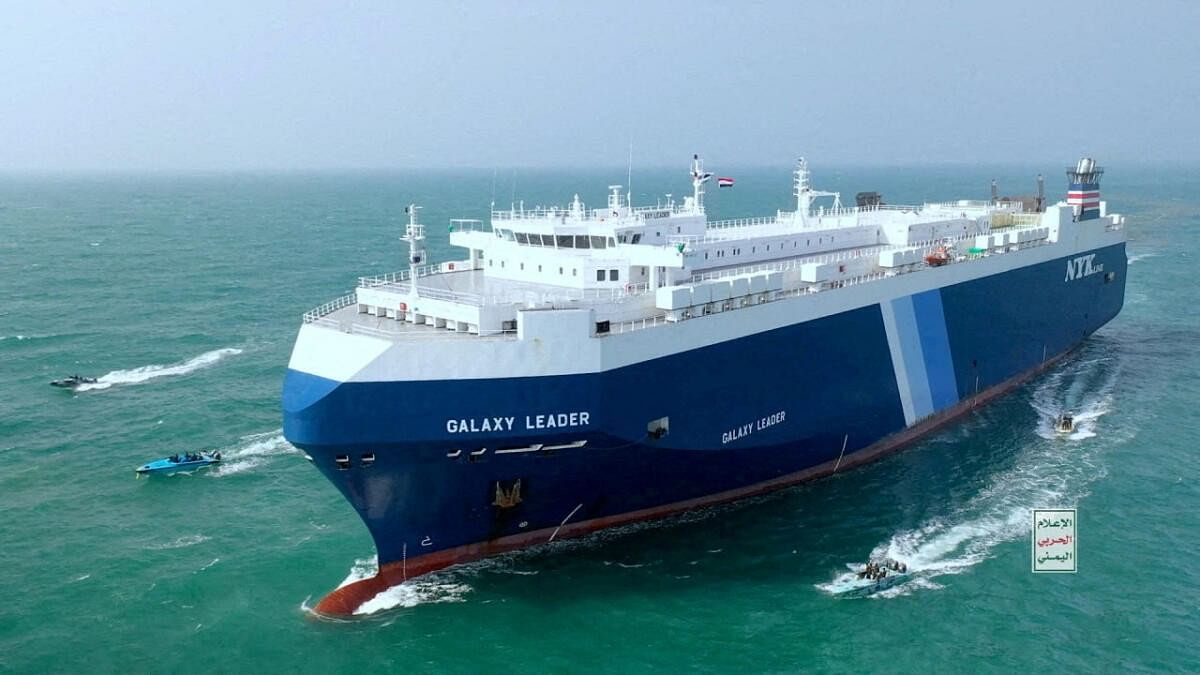
The Galaxy Leader cargo ship is escorted by Houthi boats in the Red Sea.
Credit: Reuters Photo
Worries that the Israel-Hamas conflict would impact the global economy had initially been dismissed, given the fact that nearby oil exporting regions continued producing and supplying without any hindrance to the rest of the world. Oil prices have been drifting downwards despite efforts by the Organisation of Petroleum Exporting Countries-Plus (OPEC+) to give an upward push by cutting output. The complacency over the ripple effects of the war in West Asia has rapidly dissipated in recent days as Yemen-based Houthi rebels have begun attacking merchant ships moving through the Red Sea. These vessels pass through the inlet after emerging from the Suez Canal. The enormity of these developments can be gauged from the fact nearly 34 per cent of global container trade and nine per cent of oil shipments go through this route.
The crisis had not made headlines here till the news appeared of drone attacks on cargo ships headed to India. One was carrying petrochemicals while the other was an oil tanker. The US Central Command declared the first attack was launched from Iran while the second was from Houthi rebels in Yemen. With these incidents, it is clear there are prospects of essential imports being derailed by drone attacks. The situation has assumed grave dimensions as it could affect the availability of critical goods, and potentially even threaten India’s energy security.
The backdrop to these events is that Houthi rebels who control large parts of Yemen and are supported by Iran sought to support Hamas in its conflict with Israel. Till now about 15 such attacks are reported to have been carried out since mid-December leading to most global shipping lines shifting to the longer, more expensive route via the Cape of Good Hope. Special freight surcharges along with higher insurance are being levied on cargoes moving through the region. The result of these higher charges and the cost of longer travel time will be inflationary pressures on the world economy, if the situation does not ease up soon.
The US Navy has stepped in to form a coalition of several countries to provide armed protection to vessels moving through the Bab el Mandeb Strait, the narrow waterway between Yemen and Eritrea which is where the ships are being attacked. Described as Operation Prosperity Guardian (OPG), the formation of the coalition has given confidence to some shipping lines to resume movement through the Suez Canal. One of the biggest merchant lines, Maersk of Denmark has decided to resume shipping through the Red Sea based on this assurance. This is despite some countries already backing out of the OPG coalition, for various reasons including the reluctance to be led by US defence forces.
For India, what is significant is that Houthi rebels are not attacking vessels that are linked to Russia or China. This is helpful as far as oil supplies from Russia are concerned as these are likely to remain unscathed. In addition, purchases from leading West Asian oil producers are largely shipped via the Persian Gulf. At the same time, drones have already hit one crude oil tanker indicating there should be no complacency on this score.
Oil prices are also rising in response to the Red Sea crisis. The increase has not been significant so far, but the market could harden further in case there is no end to the problem.
Another major concern is the fate of exports moving to major markets in Europe and the US. In case the higher freight and insurance charges continue for a while, it will make Indian goods much more expensive. The volume of exports moving through the Suez Canal is of the order of $200 billion. This could affect key agricultural commodities such as basmati rice, in addition to a wide range of manufactured products. To add to the woes being faced by India’s seaborne trade, piracy emanating from Somalia has been growing over the past year.
There is no easy solution to deal with the depredations of the Houthi rebels, given that they aim to support Hamas. The only firm resolution to the issue would be a cessation of hostilities — an objective being sought by most of the world. In case the West Asian war continues, the outcome can only be adverse for a global economy that has already been facing the ramifications of geopolitical tensions since the Ukraine war erupted last year.
India has so far been more resilient than other emerging economies in this regard. But it may find it difficult to deal with fresh inflationary pressures and potential shortages of critical goods if the Red Sea crisis is not resolved as soon as possible.
(Sushma Ramachandran is a senior journalist.)
Disclaimer: The views expressed above are the author's own. They do not necessarily reflect the views of DH.